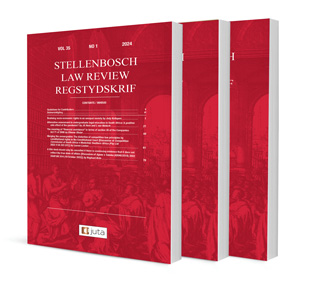
Situated in time and space [Discussion of Gongqose v Minister of Agriculture, Forestry and Fisheries 2018 5 SA 104 (SCA)]
Author: Lindani Mhlanga
ISSN: 1996-2193
Affiliations: BA LLB LLM LLD
Source: Stellenbosch Law Review, Volume 35 Issue 3, 2024, p. 273-288
https://doi.org/10.47348/SLR/2024/i3a4
Abstract
This contribution draws inspiration from a recently published book chapter, “The Trans-Temporality of Land Ownership in South Africa” by GE Kamdem Kamga and I de Villiers, which I have had the pleasure of reading and responding to in its formative stages. The chapter critically examines the evolving concept of land ownership within the suburbs of Bloemfontein, South Africa, particularly through the lens of time. Drawing from interviews conducted in the Cape Stands area, the chapter reveals how residents assert land ownership based not only on conventional legal instruments, such as title deeds, but also on non-traditional grounds like inheritance and longterm occupation. This exploration highlights the dual role of time in both entrenching inequality and offering a pathway to remedy it. The chapter juxtaposes conventional formal and informal understandings of land ownership, arguing that the passage of time has blurred the lines between this distinction, making it increasingly irrelevant in the eyes of those in possession. Building on this thesis, this contribution investigates whether the passage of time has, indeed, created the necessary space to reframe our understanding of land ownership, with the potential to address longstanding structural inequalities in South Africa. Using the landmark case of Gongqose v Minister of Agriculture, Forestry and Fisheries 2018 5 SA 104 (SCA) as a focal point, the contribution explores the viability of this temporal space in facilitating transformative outcomes. It critically examines whether time has passed without any significant changes in traditional patterns of land ownership or whether there has been meaningful progress in creating opportunities to rethink and restructure land ownership in a more equitable and just manner.